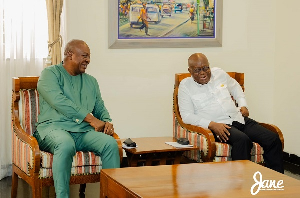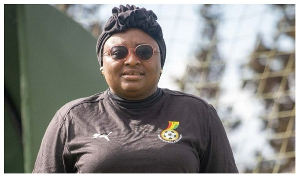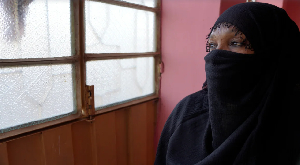Poverty & The Plight Of Children Living With HIV In Techiman Municipality
BY JOSEPH ZIEM
Living with HIV, medical doctors say, should be seen as living with any other medical condition or illness that has effective treatment but no cure for it. Doctors will always advise patients to take their medications alongside with nutritious meals in order to ensure that the body respond to effective treatment.
Unfortunately, it is a matter of life and death for many people living with conditions such as HIV or AIDS when they are unable to come by food to take their antiretroviral drugs prescribed for them by a medical doctor. Such is the plight of many children living with the Human Immunodeficiency Virus (HIV) particularly, 11 year old Sarah from Aworowa, a suburb of Techiman North District in the Brong-Ahafo Region of Ghana.
Sarah lost both parents when she was just about 5 years old. She is a class three pupil and currently being cared for by her aged aunt, Auntie Akua, who only subsist through peasant farming.
Auntie Akua told this writer, that her niece Sarah was brought into her home as soon as her mum and dad passed away. Not too long after Sarah had come to stay with her, she started falling sick. “Everybody in the family thought Sarah was a witch. She was taken to prayer camps and at one prayer camp, the man of God told us Sarah was a witch”, Auntie Akua disclosed.
Sarah’s condition, according to auntie Akua, started getting worse by the day even though the so called man of God is believed to have cast out the witchcraft. “Eventually, I decided to take her to the Holy Family Hospital in Techiman where she was diagnosed of HIV. This was in 2012”, she recalled.
As narrated by Auntie Akua, ever since Sarah was diagnosed of HIV, she has been on medication and her condition has improved fairly well as compared to when she was not yet diagnosed of the virus. But, lack of money and food at times, makes Sarah to skip her medication because the drugs are so potent and ought to be taken with nutritious food.
“I need help from the public. I wish someone more capable than me could adopt Sarah or come to our aid with sufficient support to enable me take very good care of her”, Auntie Akua pleads.
Sarah also told this writer, she is interested in schooling but due to frequent attacks by opportunistic infections such as diarrhoea, body pains, pneumonia, pulmonary tuberculosis and among others, she sometimes skip school.
Simon Mensah, a social worker at the Holy Family Hospital who takes serious interest in children living with HIV, bemoaned the poor welfare of such children in the Techiman Municipality. He told this writer in an interview, that his department has put together 36 adolescents as a solidarity group. These adolescents, he said, are between the ages of 11 and 22 who periodically come to the hospital for their antiretroviral drugs.
Mr. Mensah, however, emphasised that, most of these adolescents contracted HIV through mother-to-child transmission and most of them have lost one parent or both mother and father. “There are additional 52 children (0-10 years) and their mothers living with HIV who are also put together as another solidarity group", he noted.
“As a social worker, their welfare is my concern. Most of them are orphans and how to get food to eat or money to seek medical care when they’re sick is a huge challenge for them. Even when their drugs finish and they have to come to the hospital for more drugs, it becomes a problem.
“A worst case scenario is what Sarah is going through as an orphan. Her auntie is old and weak and can’t afford everything that she needs as a child living with the virus. Mostly, she has to walk about 4 miles in and out from Aworowa to the hospital every month for her drugs when they finish. This is because, she doesn’t have GH¢3.00 (US$1 dollar) to board a taxi.” Mr. Mensah said.
But for the intervention of two medical doctors, Dr. Jacqueline and Dr. Ursula and the HIV Coordinator who work at the Holy Family Hospital, Mr. Mensah said, the conditions of these children perhaps would have been nothing to write home about.
“I meet with all these children every quarter for us to discuss ways to fight stigma, avoid cross infection, adhering to proper treatment schedules and eating well to be healthy. Thanks to Dr. Jacqueline and Dr. Ursula and the HIV Coordinator who have since 2013 taken it upon themselves to provide them with snack and refreshment whenever we meet and also transportation for some of them who are not able to afford transportation", he acknowledged.
Despite the challenges confronting these children, checks by this writer suggest a few of them like Sarah are in school. Unfortunately, they do not know their fate yet and are most likely to end up like some of their colleagues who completed junior high school but could not progress due to financial difficulty.
Mr. Mensah is therefore appealing to well-meaning Ghanaians, corporate institutions and philanthropists to come to the aid of the children. “We need to help these young ones to learn some skills like hairdressing, sewing, soap making, basic ICT and among others. This will enable them to become independent in future when they are assisted to establish their own businesses and settle down.”
“Some of the young girls in their teens and above have shown signs of being sexually active and want to go into relationship. They sometimes ask me whether it is possible for them to get men who are also HIV positive and willing to marry them. At least for them, this will ease the financial burden they’re going through in life.
“This is a challenge for me to deal with since they see me as their source of hope.....as a father. I just have to continue counselling them and discourage them to dispel the notion of going into relationship now since they’re likely to get pregnant, contract other STIs or infect other people who may not have the virus. I have to always try to meet their needs each time any of them need something”, Mr. Mensah disclosed.
According to the Ghana AIDS Commission, the national HIV prevalence in 2013 was 1.3 percent. An estimated 224, 488 persons made up of 189, 931 adults and 34, 557 children (15 percent) are living with HIV in Ghana. There were 7, 812 new infections; 2, 407 in children from 0-14 years and 5, 405 in adults. There were 10, 074 AIDS deaths being 2, 248 in Children from 0-14 years, and 7, 826 adults. The estimated number of children orphaned by AIDS is 184, 168.
The UNAIDS also indicates that, the number of new HIV infections has declined globally by 21 percent since the estimated peak of the epidemic in 1997. Currently, 35.3 million people are living with HIV worldwide and 47 percent of people living with HIV worldwide are women. In 2012, 260, 000 new HIV infections were detected among children and 95 percent are in low and middle-income countries including Ghana.
The global theme for this year’s World AIDS Day on December 1st was “Getting to Zero.” Ghana chose the sub-theme: “Ghana towards an HIV free generation through prevention of mother-to-child transmission of HIV, safe sex and stigma reduction.”
Getting to zero according to the Ghana AIDS Commission, means that as many Ghanaians as possible must know their HIV status. Persons living with HIV must be on effective and uninterrupted treatment.
As a nation, “we must work together to close the gap between people who need treatment and those who are currently on treatment. We must reach out to the more vulnerable populations with targeted HIV prevention and care services in an environment free of HIV related stigma and discrimination. Above all we must reduce AIDS related deaths” it said in a statement issued in November.
Pop music legends Michael Jackson (R.I.P) and Lionel Richie in their 1985 charity song titled “We’re The World” said: “There comes a time when we hear a certain call that the world must come together as one. There are people dying and it is time to lend a hand to life, the greatest gift of all. We cannot go on pretending day by day, that someone somewhere will soon make a change. We are all a part of God's great big family and the truth; you know love is all we need”.
As a voice of change, I travelled all the way from Tamale which is my official post as correspondent of The Daily Dispatch to Techiman, when I heard about the plight of these children, to do this story. For me, that is how I can contribute to helping these children. How about you that is reading this article? Please, if you have any form of support, kindly call Mr. Mensah Simon, Social Worker, Holy Family Hospital Techiman on telephone number 0509111772, or via email hfhtechiman@yahoo.co.uk and show your love. No amount of aid is small. On behalf of the children, I say thanks for your support.
Joseph Ziem
Development Journalist
The Daily Dispatch Newspaper, Ghana
ziemjoseph@gmail.com
Opinions of Sunday, 14 December 2014
Columnist: Ziem, Joseph


















